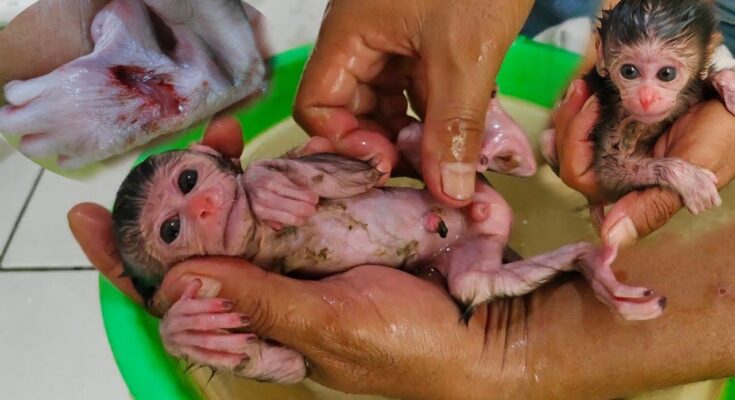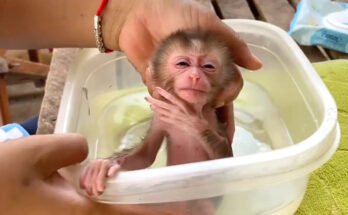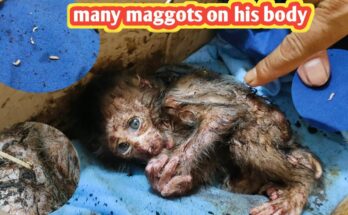Newborn baby monkeys, especially those born prematurely, require special care and attention. Their delicate state makes cleaning and nurturing them a sensitive task. Unfortunately, in animal markets, these vulnerable creatures are often exposed to poor conditions that can impact their health and well-being. This article explores the essential cleaning methods for premature baby monkeys and sheds light on the harsh reality of animal markets.
How to Properly Clean Newborn Baby Monkeys
- Use Lukewarm Water: Avoid using cold or hot water. Lukewarm water helps maintain their body temperature.
- Gentle Wipes: Use soft, hypoallergenic wipes to clean their bodies. Avoid scented products as they may irritate their sensitive skin.
- Drying Carefully: Pat them dry gently using a soft, clean towel. Do not rub as their skin is very delicate.
- Maintain a Clean Environment: Ensure the area is sanitized to reduce the risk of infections.
The Harsh Reality of Animal Markets
In many animal markets, newborn baby monkeys are sold under poor conditions. These markets often lack hygiene standards, which can lead to infections and high mortality rates among these vulnerable creatures.
- Unhygienic Conditions: Lack of proper sanitation exposes premature baby monkeys to bacteria and diseases.
- Poor Nutrition: Inadequate feeding practices lead to malnutrition and stunted growth.
- Emotional Trauma: Being separated from their mothers at an early stage causes stress and affects their emotional development.
The Need for Awareness and Change
Raising awareness about the harsh conditions in animal markets is crucial. Supporting ethical practices and advocating for better regulations can help improve the lives of these newborn baby monkeys.
Conclusion
Caring for premature baby monkeys requires careful cleaning and a hygienic environment. Unfortunately, the reality in animal markets is far from ideal. By understanding their needs and advocating for better practices, we can help provide a better future for these vulnerable creatures.
Baby Monkey: An Adorable and Fascinating Creature
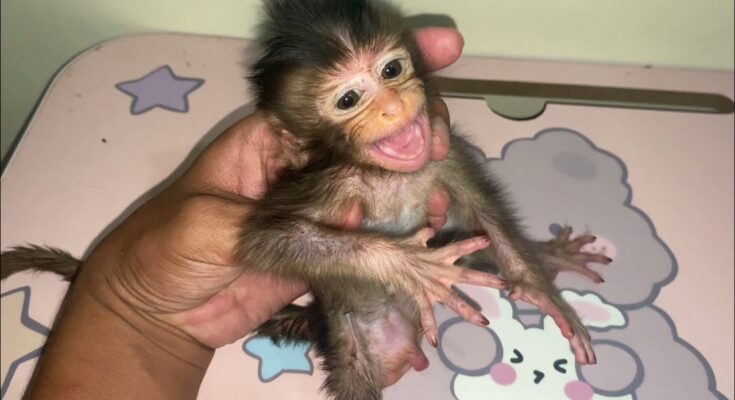
Baby monkeys are among the most adorable and intelligent animals in the world. With their playful nature, curious eyes, and tiny fingers, they capture the hearts of many. Found in various parts of the world, these little primates are born with incredible survival instincts and develop quickly under the care of their mothers and social groups.
Welcome Your Baby Monkey with Love! 🐒❤️ Discover essential care tips for nurturing your newborn primate. From nutrition and bonding to creating a safe environment, learn how to ensure your little monkey thrives. Explore expert advice and fun facts about their unique needs. Start your adventure in primate parenting now!
Baby Monkey: An Adorable and Fascinating Creature
Baby monkeys are among the most adorable and intelligent animals in the world. With their playful nature, curious eyes, and tiny fingers, they capture the hearts of many. Found in various parts of the world, these little primates are born with incredible survival instincts and develop quickly under the care of their mothers and social groups.
Birth and Early Development
Most baby monkeys are born after a gestation period that varies depending on the species. For example, a rhesus macaque has a gestation period of about 165 days, while a chimpanzee’s pregnancy lasts around 230 days. At birth, baby monkeys are usually small, helpless, and heavily dependent on their mothers for nourishment and protection. They cling to their mother’s fur tightly and rely on her for movement and safety.
In the initial weeks, baby monkeys are primarily fed on their mother’s milk, providing essential nutrients for their growth. As they develop, they begin to explore their surroundings and eventually start eating solid foods, such as fruits, leaves, and insects, depending on their species.
Social Behavior and Learning
Baby monkeys grow up in close-knit groups, often called troops or colonies, which play a crucial role in their social and cognitive development. Through interactions with siblings and other troop members, they learn essential survival skills, including climbing, foraging, and communication.
Monkeys are known for their advanced intelligence, and even at a young age, baby monkeys display problem-solving skills and emotional intelligence. They communicate through vocalizations, facial expressions, and body language to express emotions such as fear, excitement, and affection.
Playful Nature and Bonding
Play is an essential part of a baby monkey’s life. They engage in playful activities such as chasing, wrestling, and swinging from branches, which help develop their motor skills and strengthen social bonds. These activities are crucial for their physical and mental development, preparing them for adulthood.
Baby monkeys also form strong attachments to their mothers and other troop members. Grooming is a significant bonding activity, where older monkeys clean the fur of younger ones, reinforcing social ties and trust.
Threats and Conservation
Despite their adaptability, baby monkeys face numerous threats in the wild. Habitat destruction due to deforestation, poaching, and illegal pet trade put many monkey species at risk. Additionally, some species are hunted for their meat or used in traditional medicine.
Conservation efforts are vital to protect these precious creatures. Many organizations work towards preserving monkey habitats, implementing anti-poaching laws, and educating local communities about the importance of primate conservation.
Conclusion
Baby monkeys are not only adorable but also highly intelligent and social creatures. Their playful and curious nature makes them a joy to watch, and their ability to learn and adapt highlights their significance in the animal kingdom. Protecting their natural habitats and ensuring their survival is crucial to maintaining the delicate balance of our ecosystems. By supporting conservation efforts, we can help secure a future for these fascinating animals and allow them to thrive in the wild.
Tragic Sight: Newborn Baby Monkey Chokes as Milk Overflows from Its Nose and Mouth
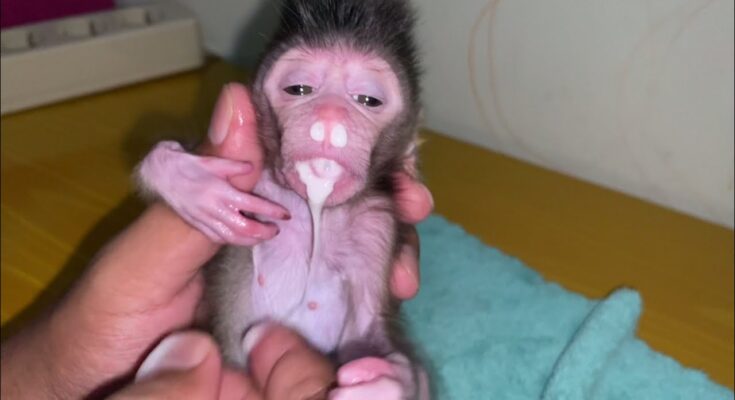
The early days of a newborn monkey’s life are supposed to be filled with warmth, nourishment, and the gentle embrace of its mother. However, a heartbreaking scene unfolded when a fragile baby monkey struggled to drink milk, only for it to overflow from its tiny nose and mouth, leaving it gasping for breath.
Helpless Baby Monkey Sleeps Peacefully, Clutching a Hand for Comfort
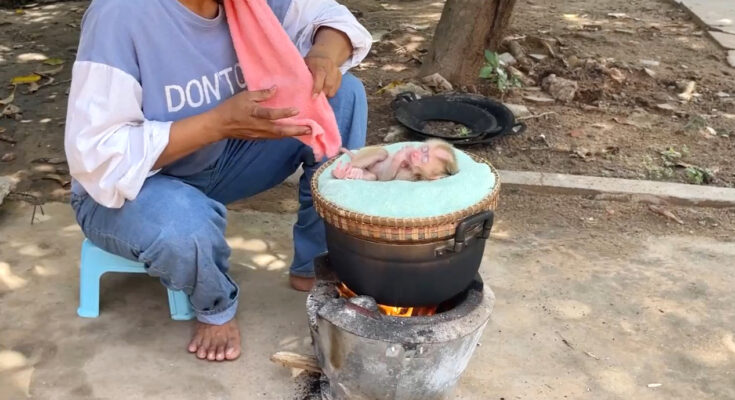
Raising a baby monkey is a big responsibility that requires deep understanding, patience, and care. These intelligent and emotional creatures need proper nutrition, warmth, and social bonding to thrive.
Can You Feed a Baby Monkey?
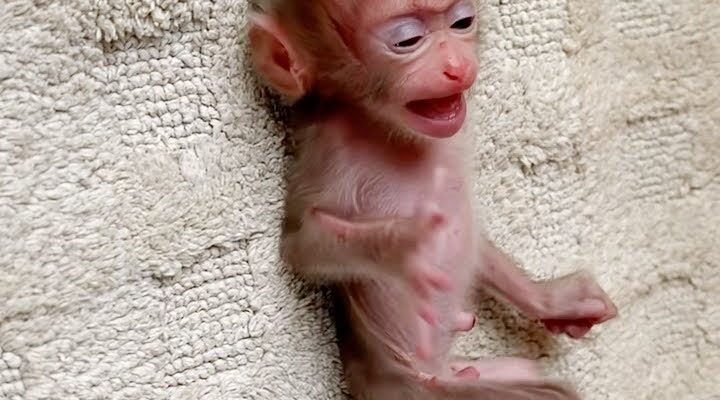
Caring for Your Newborn Baby Monkey Made Easy! 🐒✨ Discover vital care tips that cover everything from feeding to playtime. Equip yourself with knowledge for a successful start in your monkey’s life. Click now to learn how to create a nurturing home!
Baby monkeys are adorable and often attract a lot of attention. If you ever come across one, you may wonder whether you can feed it. While feeding a baby monkey might seem like a kind gesture, it is essential to understand their dietary needs and the potential risks involved.
Understanding a Baby Monkey’s Diet
In the wild, baby monkeys rely on their mother’s milk for nutrition. As they grow, they gradually transition to solid foods, including fruits, leaves, and insects. The diet of a baby monkey depends on its species, age, and environment.
Can You Feed a Baby Monkey Formula or Milk?
If a baby monkey has been separated from its mother, it may require special formula designed for primates. Cow’s milk and other dairy products can be harmful because they do not provide the right nutrients and may cause digestive issues. Specialized primate formulas, often used in zoos and rescue centers, are the best option.
What Solid Foods Can a Baby Monkey Eat?
Once a baby monkey begins to wean, it can start eating soft fruits like bananas, mangoes, and papayas. Other recommended foods include:
- Boiled sweet potatoes
- Soft vegetables like carrots and cucumbers
- Small amounts of cooked rice or oats
It is crucial to avoid processed or sugary foods, as they can harm a baby monkey’s health.
Risks of Feeding a Baby Monkey
While feeding a baby monkey might seem harmless, there are several risks to consider:
1. Dependency on Humans
Feeding wild or rescued monkeys can lead to dependency, making it difficult for them to survive on their own.
2. Nutritional Imbalances
Improper feeding can lead to malnutrition or digestive issues, especially if the monkey receives an unbalanced diet.
3. Legal and Ethical Concerns
In many countries, keeping or feeding wild monkeys without proper permits is illegal. It is always best to consult wildlife experts or rehabilitation centers before attempting to feed a baby monkey.
What to Do If You Find an Orphaned Baby Monkey
If you encounter an abandoned or injured baby monkey, the best course of action is to contact a local wildlife rescue center. Trained professionals know how to care for young monkeys properly and will ensure they receive the necessary care.
Conclusion
While it might be tempting to feed a baby monkey, it is not always the best decision. Monkeys have specific dietary needs, and improper feeding can do more harm than good. If you ever come across a baby monkey in need, the best approach is to seek help from wildlife professionals.
Newborn Baby Monkey’s First Bath – Adorable Reaction to Water!
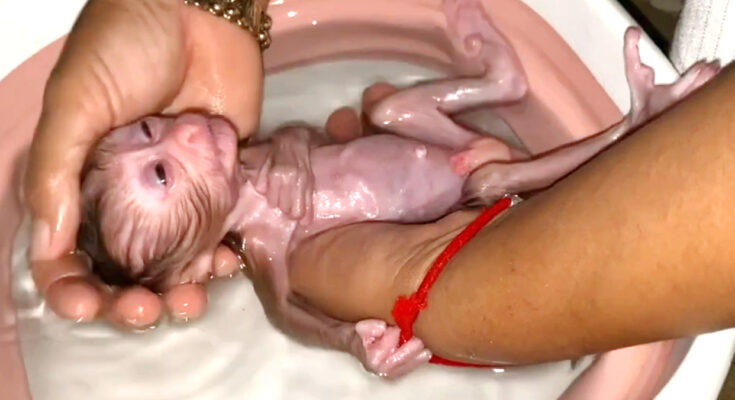
Discover Essential Tips for Raising a Newborn Baby Monkey! 🐒✨ From bonding basics to health care, learn how to give your baby monkey the best start. Dive into the world of primate parenting and uncover expert advice on nutrition, safe handling, and creating a nurturing environment. Whether you’re a first-time caregiver or an animal enthusiast, these tips will help ensure your little one’s growth and happiness. Start your journey with confidence!
Step-by-Step Guide to Feeding a Baby Monkey 🍼🐒
- Understand Their Diet
Baby monkeys require a diet similar to what they’d consume in the wild. Start with specialized milk formulas for primates or fruits like bananas and papayas. - Sanitize Feeding Tools
Always use clean bottles, syringes, or bowls to prevent infections. Hygiene is crucial for their health. - Feed Small Portions
Begin with small amounts to avoid overfeeding. Monitor how much they eat to adjust as they grow. - Maintain a Feeding Schedule
Feed baby monkeys every 2–3 hours for newborns, gradually spacing it out as they age. - Observe Behavior
Watch for signs of hunger or discomfort. If they seem distressed, consult a vet experienced with exotic animals. - Provide Fresh Water
Ensure they have access to clean water at all times for hydration. - Introduce Solid Foods Gradually
Around 6–8 weeks, begin introducing soft fruits and vegetables alongside milk. - Create a Bond While Feeding
Feeding time is a great opportunity to build trust. Be gentle and patient. - Consult a Vet Regularly
Regular health checks ensure the baby monkey is growing strong and healthy.
Baby monkeys are incredibly fascinating creatures with a mix of intelligence, curiosity, and playfulness that captures the hearts of many. Here are some interesting facts about baby monkeys:
Bringing a baby monkey into your family might seem like a cute and exciting idea, but before you consider feeding and caring for one, it’s important to understand the challenges and ethical concerns involved.
Caring for Your Newborn Baby Monkey Made Easy! 🐒✨ Discover vital care tips that cover everything from feeding to playtime. Equip yourself with knowledge for a successful start in your monkey’s life. Click now to learn how to create a nurturing home!
Why Feeding a Baby Monkey Can Be Problematic
1️⃣ Dietary Needs Are Complex – Baby monkeys require a highly specialized diet to grow strong and healthy. They need a mix of fruits, vegetables, proteins, and essential nutrients that are difficult to replicate in a human home. Feeding them the wrong foods can lead to severe health issues, including malnutrition and digestive problems.
2️⃣ Dependency and Behavioral Issues – Feeding a baby monkey in a home environment can cause it to become overly dependent on humans. As they grow, monkeys can become aggressive, territorial, and unpredictable, making them difficult to manage.
3️⃣ Health Risks for Both the Monkey and Humans – Monkeys can carry diseases that are dangerous to humans, and vice versa. Close contact, including feeding, increases the risk of disease transmission.
4️⃣ Legal and Ethical Considerations – In many places, owning or feeding a monkey is illegal without proper permits. Baby monkeys belong in the wild or specialized sanctuaries where they can thrive naturally.
What’s the Best Alternative?
If you love baby monkeys, the best way to support them is by learning about their natural habitat, supporting conservation efforts, and visiting ethical sanctuaries. Instead of trying to feed one at home, consider donating to organizations that help rehabilitate and protect these intelligent creatures.
Final Thought
While feeding a baby monkey might seem like a caring gesture, it often does more harm than good. These wild animals deserve to live in their natural environment, surrounded by their own kind, where they can grow and thrive as nature intended.
What are your thoughts on keeping baby monkeys as pets? Let’s discuss in the comments! 🐒💬
